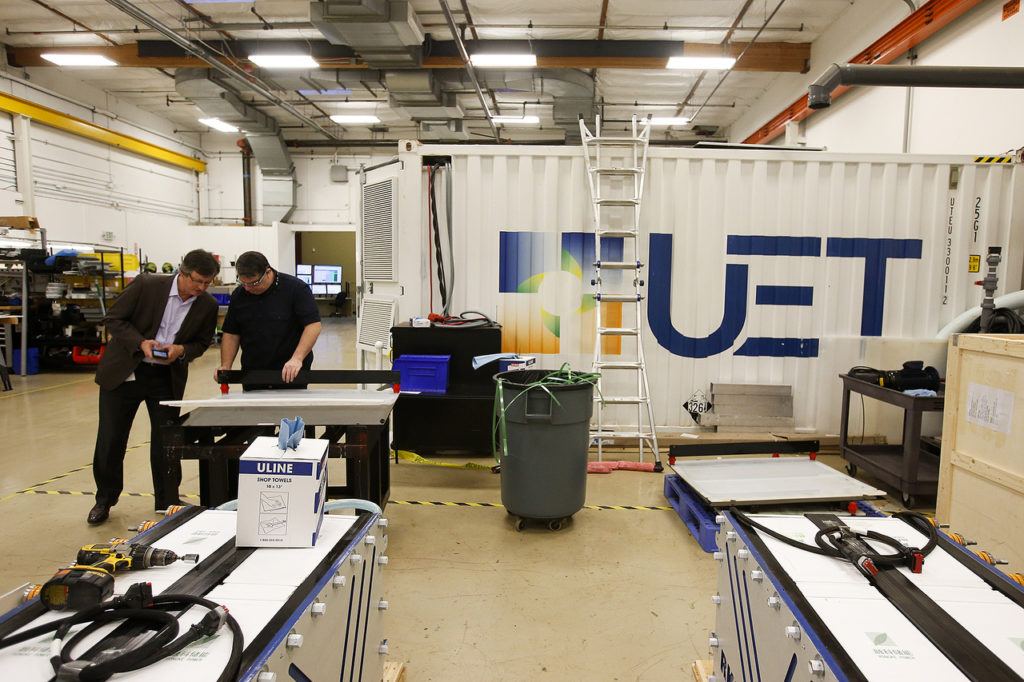MUKILTEO — In an unassuming building in Mukilteo, a building whose biggest former tenant rented tents, chairs and tableware for weddings and other events, a local company aims to change the way we make, move and use electricity.
UniEnergy Technologies, or UET, makes giant batteries for utilities and customers who consume huge amounts of electricity. Batteries are a critical component of shifting from older sources of energy — coal, nuclear, even hydro to some extent — to renewable sources, such as wind and solar. UET wants its batteries to power the evolution to renewable energy.
The company has a handful of batteries installed in the field, including its latest: an energy storage system that the Snohomish County Public Utility District recently put in near downtown Everett. It has won several other contracts and is in the running for more work.
Its sector of the power industry — energy storage — once only existed in the future. The technology has come along by leaps and bounds in recent years, though.
Twenty years ago, engineers at power utilities dismissed renewables as “junk energy,” said Dave Tomlinson, a project development manager at UET with nearly three decades in the industry. Wind turbines generated electricity when the wind blew, but if that happened when there’s little need for energy, such as the middle of the night, the wind power could be more headache than help. There was no way to store the energy to use during the day, when demand is high.
Utility companies are focused on making sure the lights are on. They want reliability, not erratic energy sources. Energy storage systems built around batteries like those built by UET can make the erratic reliable.
There are dozens of companies competing for a slice of the emerging energy storage market. Nearly all — about 97 percent — of the energy storage systems installed in 2015 and early 2016 used lithium-ion batteries, according to Greentech Media, an online news organization covering clean energy.
The remaining 3 percent was vanadium flow batteries installed by UET near Spokane for Avista Utilities. Like all UET installations, the batteries are enclosed in shipping containers.
Now, “we’re going to go and get some of that 97 percent,” said Russ Weed, UET’s vice president of business development.
Flow batteries store energy in fluid, and discharge it by creating an electro-chemical reaction when the liquid is pumped through its internal system. UET’s batteries use a vanadium molecule developed by the Pacific Northwest National Laboratory, or PNNL, in Richland, where the company’s co-founder, Gary Yang, previously worked.
“It was a team effort. Please give credit to PNNL,” the soft-spoken Yang said.
Born in Dalian, a city near China’s border with North Korea, Yang came to the United States in 1994 — a move delayed by the Chinese government’s massacre of pro-democracy demonstrators in Tienanmen Square. He earned a Ph.D. at the University of Connecticut and did post-doctoral research at the Carnegie Mellon University. In 2000, he went to work at PNNL, where he and a colleague, Liyu Li, helped refine the chemistry used in UET’s batteries. The two saw the opportunity for a breakthrough in energy storage, and in 2012, founded UET with startup money — about $25 million — from Dalian Bolong Holding Co., a Chinese firm based in the region where Yang grew up.
Weed joined the company early on. “When we moved into this building in the fall of 2012, there was mold in the walls, because the windows had leaked,” he said. “We huddled in the lunch room wearing winter coats because there was no heat, tapping away on our laptops.”
The company has grown from eight people then to about 60. Along the way, the company was caught up in an ethics scandal at the PUD sparked by no-bid contracts given to a former PUD employee’s company, 1Energy Systems. The state’s Executive Ethics Board investigated and dismissed charges that UET’s legal counsel used his ties with the state to steer public grant money to the PUD project involving UniEnergy.
The plan is to expand production and grow to about 200 employees by 2019. At that point, company leaders want to be turning out four battery containers each day.
Several battery manufacturers, including Elon Musk’s Tesla, are competing for a slice of the emerging energy storage market. Few are as well placed as UET to succeed, said Garth Corey, an energy storage expert.
Corey spent most of his career at Sandia National Laboratories leading research on energy storage, and since retiring from there in 2006, has worked as an independent consultant. Several companies hoping to break into the energy storage sector, including UET, have hired Corey to kick the tires on their products and business models. His no-nonsense attitude has earned him the nickname of “Crusty Garth.”
UET has “built the right team” with a broad range of expertise, he said.
Corey has seen many companies built around one or two experts, but energy storage covers many areas: chemistry, materials, electricity and so on.
The company has solved difficult technical challenges to “make their battery extremely efficient,” he said.
UET has enough money to continue expanding in the next few years, said Rick Winter, the company’s president and chief operations officer.
It raised $25 million from Orix, a Japan-based investment firm, and Dalian Bolong in late 2015. The company is doing a third round of fundraising in 2017.
Of course, more money means growing at a faster pace, he said. “Acceleration is very valuable. We don’t want to be coming to market in two years. We want to come to the market now.”
Dan Catchpole: 425-339-3454; dcatchpole@heraldnet.com; Twitter: @dcatchpole.
Talk to us
> Give us your news tips.
> Send us a letter to the editor.
> More Herald contact information.




























